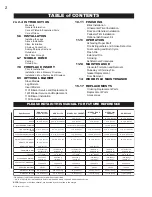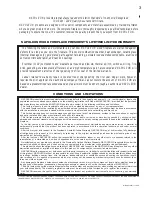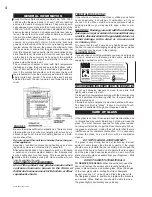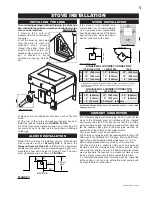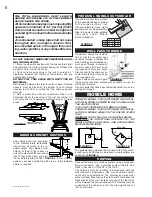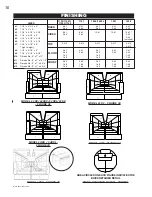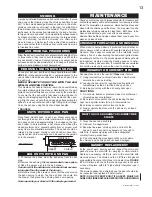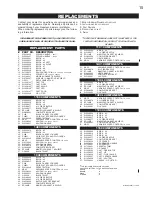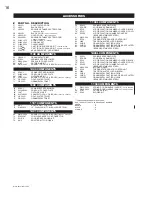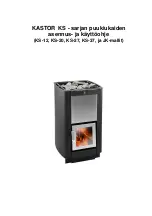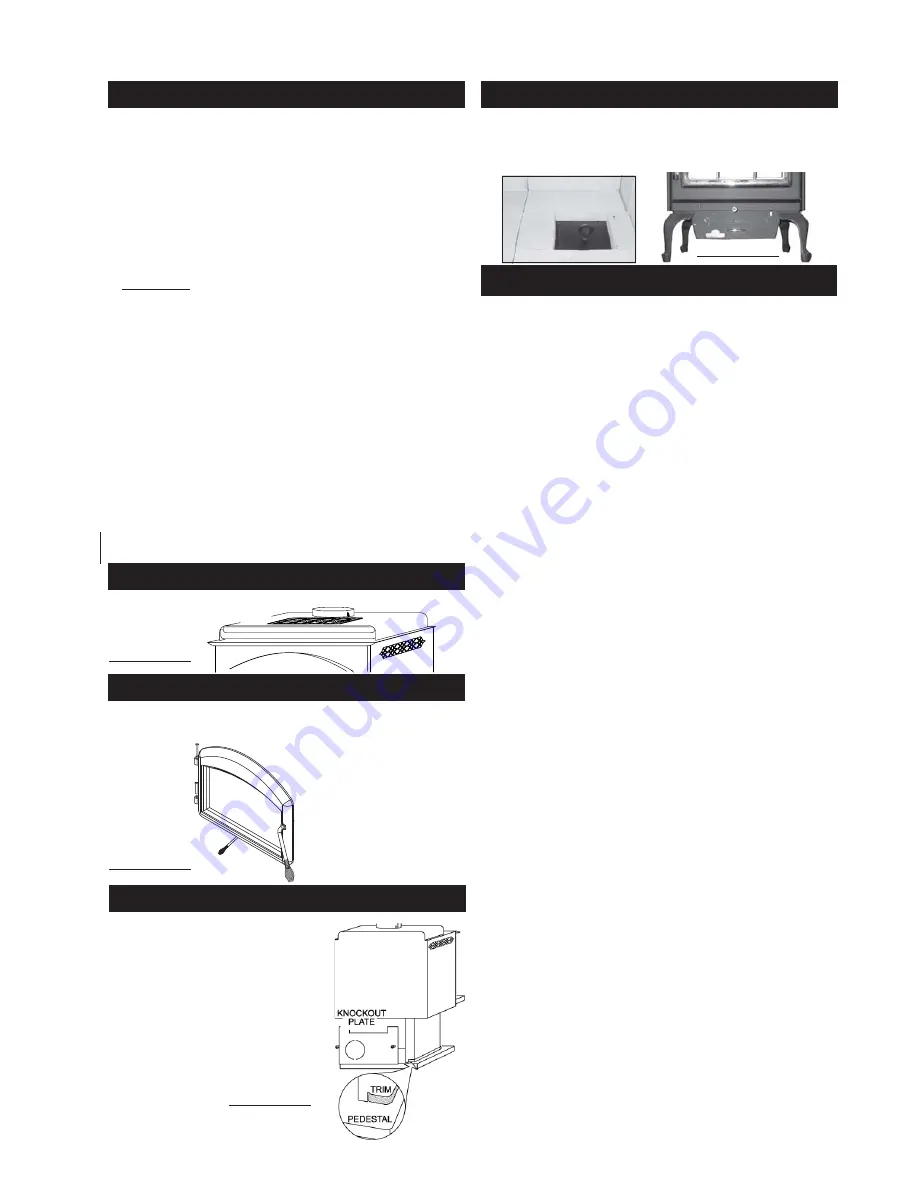
11
W415-0512 / B / 11.15.05
With stove and chimney installation completed, move the
bricks into place by working as illustrated for your unit on
page 10.
1.
Install two or three courses of brick on both sides of the
unit. Install two courses on the back wall. Install the final
course of bricks on the back wall. These bricks are held in
place by a brick retainer. Before installing the bricks, loosen
the screw holding the retainer and ensure that it has been
moved forward. Insert the final two bricks behind the re-
tainer and while still holding the bricks in place, slide the
retainer snugly into place. Retighten the screw.
2.
1900 only:
Place the stainless steel support onto the top row of the
bricks as illustrated on page 10.
Pivot the 2 piece baffle up and onto the support, then
slide them over and onto the flange of the manifold. En-
sure that the overlaps are interlocked to close the gap.
Push the baffles to the rear of the firebox. Repeat for
the opposite side.
3.
Carefully pivot fibre baffle up onto the top of the side
brick. Slide it over onto the flange of the manifold.
Ensure that the top baffles are pushed all the way to the
rear of the firebox, leaving a minimum of a 1 inch gap
along the front. This will allow the flue gases to escape the
firebox
.
4.
Install the bottom bricks, working from the back of the
unit.
5.
Install the 2 bricks along the front.
NOTE: DO NOTE OPERATE IF BAFFLE AND MANIFOLD SHEILD
ARE NOT IN POSITION
Insert the ornamental trivet into the space on the stove top.
Hang the door using the hinge pins supplied. Twist the
large wire handle over the end of the handle rod.
Twist the smaller wire
handle over the end of
the air damper rod be-
low the door. Install ash
pan pull handle using
screws and washers.
See
FIGURE 26.
Ensure that the pedestal surfaces are
clean and dry; peel the protective
backing from the trim adhesive. In-
sert one end of the brass trim into
one of the slots located in the ped-
estal and pressing firmly, proceed
around to the other slot. Cut trim to
size. Attach the rear knockout plate
(located inside the ash pan for ship-
ping purposes).
TRIVET
CAUTION:
Never use gasoline, gasoline-type lantern
fuel, kerosene, charcoal lighter fluid, or similar liquids
to start or ‘freshen up’ a fire in this heater. Keep all such
liquids well away from the heater while it is in use.
Objects placed in front of the fireplace should be kept a
minimum of 5” from the front face.
Your Napoleon EPA listed product is a Hi-Tech unit, de-
signed with the most advanced technology. The unit is ex-
tremely airtight. It has an exclusive direct outside air supply
(optional kit), a safety feature designed to prevent spillage,
and to keep your house free of carbon monoxide, in case of
a downdrafting chimney or an internal negative pressure.
The first fire(s) in your unit will be difficult to get going and
keep going with little amount of heat being generated. This
is a result of the moisture being driven out of the fire brick.
Allow 30 to 40 hours of hot fires ( temperatures in excess of
500°F - 600°F) before your unit will perform normally. Dur-
ing the break-in period (the first 2 or 3 fires) create only
small, hot fires using kindling; this will allow the firebrick to
cure. Do not be alarmed if small hairline cracks develop in
the firebrick. This is a normal occurrence and does not
pose a safety hazard. The paint may also smell a little for
the first few fires as it cures and you may wish to open a
door or window to alleviate the smell.
To start, a brisk fire is required. Place loosely crumpled
paper on the floor of the stove and cover with dry kindling.
Open the draft control fully by pulling the lever forward. Light
the paper and leave the door slightly ajar (one inch) until all
kindling is burning. To maintain a brisk fire, a hot coal bed
must be established and maintained.
Slowly add larger wood (2x4 size pieces). Lay the pieces
lengthwise from side to side in the hot coal bed with a
shallow trench between, so that the primary air can flow
directly into this trench and ignite the fuel above. When the
fire seems to be at its peak, medium sized logs may be
added. Once these logs have caught fire, carefully close
the door. (Closing the door too quickly after refueling will
reduce the firebox temperature and result in an unsatisfac-
tory burn.) Remember it is more efficient to burn medium
sized wood, briskly, and refuel frequently than to load the
fireplace with large logs that result in a smouldering, inef-
ficient fire and dirty glass.
As soon as the door is closed, you will observe a change in
the flame pattern. The flames will get smaller and lazier be-
cause less oxygen is getting into the combustion chamber.
The flames, however, are more efficient. The flames will re-
main lazy but become larger again as soon as the firebricks
have been heated thoroughly and the chimney becomes
heated and provides a good draft. At this point, the roaring fire
that you see when the door is opened is wastefully drawing
heated room air up the chimney -- certainly not desirable.
Always operate with the door fully closed once the medium
sized logs have caught fire.
FIGURE 26
FIGURE 27
FIGURE 28
OPERATION
BRICKS AND BAFFLES INSTALLATION
ORNAMENTAL TRIVET INSTALLATION
DOOR AND HANDLE INSTALLATION
PEDESTAL TRIM INSTALLATION
Models 1100L / 1400L Only:
Provisions have been made
on the stove to install an optional ash drawer kit. The EPAD-
KT kit allows for convenient removal of excess ash. This kit
can be purchased through your Napoleon Dealer.
OPTIONAL ASH DRAWER KIT
FIGURE 29
Содержание 1100C
Страница 19: ...19 W415 0512 B 11 15 05 NOTES...
Страница 20: ...20 W415 0512 B 11 15 05 NOTES...


